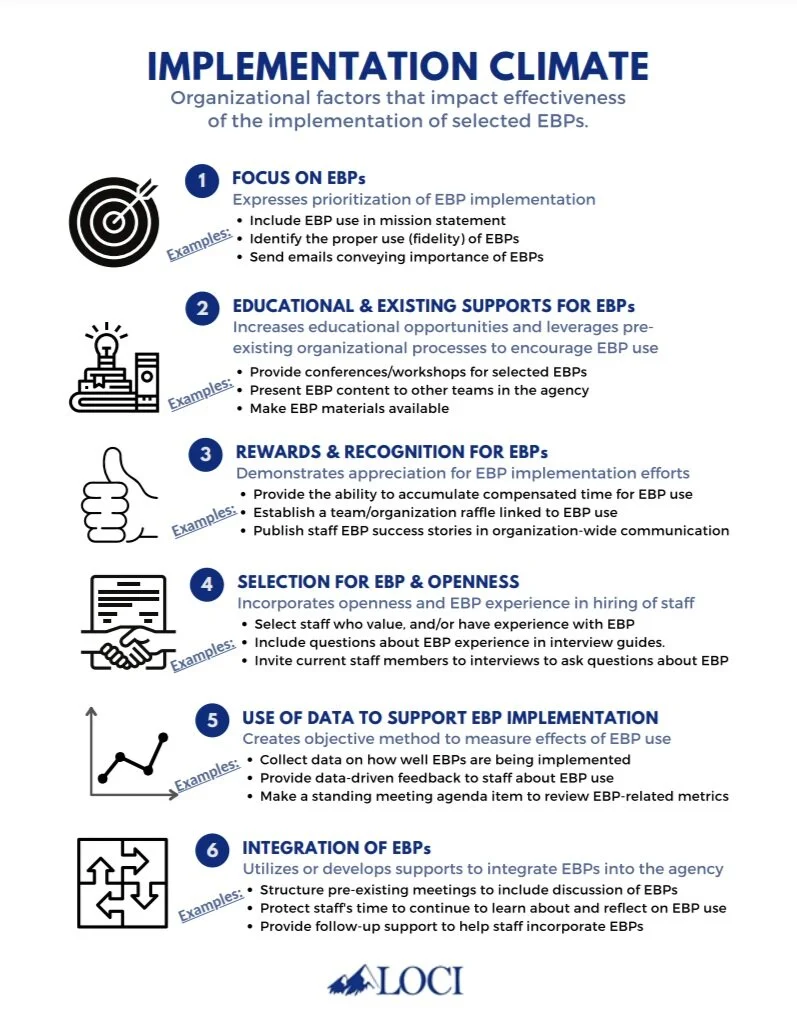
Organizational Climate and Culture
Organizational Climate is “the shared meaning organizational members attach to the events, policies, practices, and procedures they experience and the behaviors they see being rewarded, supported, and expected” (Ehrhart, Schneider, & Macey, 2014).
Handouts
Books
Publications
Aarons, G.A., Ehrhart, M.G., Farahnak, L.R., Sklar, M. (2014). Aligning leadership across systems and organizations to develop a strategic climate for evidence-based practice implementation. Annual Review of Public Health, 35, 255-274.
Aarons, G.A., & Palinkas, L.A. (2007). Implementation of evidence-based practice in child welfare: Service provider perspectives. Administration and Policy in Mental Health and Mental Health Services Research, 34(4), 411-419.
Aarons, G. A., & Sommerfeld, D. H. (2012). Leadership, innovation climate, and attitudes toward evidence-based practice during a statewide implementation. Journal of the American Academy of Child & Adolescent Psychiatry, 51(4), 423-431.
Aarons, G.A., Sommerfeld, D.H., Hecht, D.B., Silovsky, J.F., & Chaffin, M.J. (2009). The impact of evidence-based practice implementation and fidelity monitoring on staff turnover: evidence for a protective effect. Journal of Consulting and Clinical Psychology, 77(2), 270.
Aarons, G.A., Sommerfeld, D.H., & Walrath-Greene, C.M. (2009). Evidence-based practice implementation: the impact of public versus private sector organization type on organizational support, provider attitudes, and adoption of evidence-based practice. Implementation Science, 4(1), 83.
Aarons, G. A., & Sawitzky, A. C. (2006). Organizational culture and climate and mental health provider attitudes toward evidence-based practice. Psychological Services, 3(1), 61.
Ehrhart, M. G. (2004). Leadership and procedural justice climate as antecedents of unit‐level organizational citizenship behavior. Personnel Psychology, 57(1), 61-94.
Glisson, C., Landsverk, J., Schoenwald, S., Kelleher, K., Hoagwood, K., Mayberg, S., Green, P., Research Network on Youth Mental Health. (2008). Assessing the organizational social context (OSC) of mental health services: Implications for research and practice. Administration and Policy in Mental Health and Mental Health Services Research, 35, 98-113.
Lehman, W.E.K., Greener, J.M., Simpson, D.D. (2002) Assessing organizational readiness for change. Journal of Substance Abuse Treatment, 22(4), 197-209.
Patterson, T.L., Semple, S.J., Chavarin, C.V., Mendoza, D.V., Santos, L.E., Chaffin, M., Palinkas, L., Strathdee, S.A., Aarons, G.A.(2012). Implementation of an efficacious intervention for high risk women in Mexico: Protocol for a multi-site randomized trial with a parallel study of organizational factors. Implementation Science, 7.
Williams, J.R., Blais, M.P., Banks, D., Dusablon, T., Williams, W.O., Hennessy, K.D. (2014). Predictors of the decision to adopt motivational interviewing in community health settings. The Journal of Behavioral Health Services & Research, 41, 294-307.




